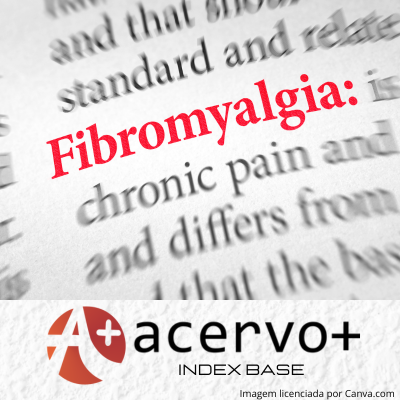Estratégias de coping para pacientes com fibromialgia na atenção primária à saúde
##plugins.themes.bootstrap3.article.main##
Resumo
Objetivo: Avaliar as diferentes estratégias de coping que podem contribuir para a redução de sintomas e melhoria da qualidade de vida de pacientes com fibromialgia na Atenção Primária à Saúde (APS). Métodos: Revisão integrativa de 15 estudos, selecionados nas bases Sistema Regional de Información en línea para Revistas Científicas de América Latina, el Caribe, España y Portugal (Latindex), US National Library of Medicine National Institutes of Health (PubMed) e Biblioteca Virtual em Saúde (BVS), abrangendo artigos publicados entre 2004 e 2024. Foram incluídos estudos nos idiomas português, inglês e espanhol, analisados por meio de tabelas estruturadas. Resultados: Quinze estudos atenderam aos critérios de inclusão, destacando-se abordagens multidisciplinares (33,3%), terapia cognitivo-comportamental (20%) e suporte social (26,67%). Estratégias ativas como aceitação da doença, exercícios físicos e técnicas de relaxamento mostraram associação positiva com diminuição da dor e melhora funcional. Terapias grupais e intervenções remotas também reforçaram efeitos benéficos na redução de ansiedade, depressão e catastrofização, melhorando a resiliência emocional. Conclusão: Estratégias de coping integradas, como abordagens multidisciplinares e suporte social, são eficazes no manejo da fibromialgia na APS. A síntese de evidências reforça a necessidade de práticas adaptadas ao contexto local, pesquisas futuras devem priorizar padronização metodológica para ampliar aplicabilidade.
##plugins.themes.bootstrap3.article.details##
Copyright © | Todos os direitos reservados.
A revista detém os direitos autorais exclusivos de publicação deste artigo nos termos da lei 9610/98.
Reprodução parcial
É livre o uso de partes do texto, figuras e questionário do artigo, sendo obrigatória a citação dos autores e revista.
Reprodução total
É expressamente proibida, devendo ser autorizada pela revista.
Referências
2. BIDONDE J, et al. Aerobic exercise training for adults with fibromyalgia. Cochrane Database of Systematic Reviews, 2017; 2017(6).
3. BOURGAULT P et al. Multicomponent interdisciplinary group intervention for self-management of fibromyalgia: a mixed-methods randomized controlled trial. PloS One, 2015; 10(5): e0126324.
4. BOYER AL et al. Comparing fibromyalgia patients from primary care and rheumatology settings: clinical and psychosocial features. Rheumatology International, 2009; 29(10): 1151 1160.
5. CLAUW DJ. Fibromyalgia: A Clinical Review. JAMA, 2014; 311(15): 1547 1555.
6. CHEN AT. Information Seeking over the Course of Illness: The Experience of People with Fibromyalgia. Musculoskeletal Care, 2012; 10(4): 212 220.
7. COOPER S, GILBERT L. The role of ‘social support’ in the experience of fibromyalgia - narratives from South Africa. Health & Social Care in the Community, 2017; 25(3): 1021 1030.
8. DAFFIN M, et al. A qualitative study of risk and resilience in young adult women with a history of juvenile-onset fibromyalgia. Pediatric Rheumatology, 2021; 19(1): 128.
9. EWERT C et al. Self-Compassion and Coping: a Meta-Analysis. Mindfulness, 2021; 12(5): 1063 1077.
10. GANONG LH. Integrative reviews of nursing research. Research in Nursing & Health, 1987; 10(1): 1 11.
11. GOLDENBERG DL. Diagnosing Fibromyalgia as a Disease, an Illness, a State, or a Trait?. Arthritis Care & Research, 2019; 71(3): 334 336.
12. HERMONT AP et al. Revisões integrativas: conceitos, planejamento e execução. Arq. odontol, 2021; p. 3–7.
13. KUNDAKCI B et al. International, multidisciplinary Delphi consensus recommendations on non-pharmacological interventions for fibromyalgia. Seminars in Arthritis and Rheumatism, 2022; 57: 152101.
14. LERA S, et al. Multidisciplinary treatment of fibromyalgia: Does cognitive behavior therapy increase the response to treatment?. Journal of Psychosomatic Research, 2009; 67(5): 433–441.
15. MARTÍN J, et al. Six-and 12-month follow-up of an interdisciplinary fibromyalgia treatment programme: results of a randomised trial. Clinical and Experimental Rheumatology, 2012; 30(6 Suppl 74): 103–111.
16. MCBETH J, et al. Cognitive Behavior Therapy, Exercise, or Both for Treating Chronic Widespread Pain. Archives of Internal Medicine, 2012; 172(1): 48.
17. MONTEIRO EAB, et al. Aspectos Psicológicos da Fibromialgia – Revisão Integrativa. Mudanças: Psicologia da Saúde, 2021; 29(1): 65–76.
18. MONTESÓ-CURTO P, et al. Nurses’ Perceptions of Patient Fibromyalgia Illness Experiences after Performing Group-Based Problem-Solving Therapy: A Qualitative Research Study. Healthcare (Basel, Switzerland), 2023; 11(11): 1531.
19. NIJS J et al. Central sensitisation in chronic pain conditions: latest discoveries and their potential for precision medicine. The Lancet Rheumatology, 2021; 3(5): e383–e392.
20. PERES MFP, LUCCHETTI G. Coping Strategies in Chronic Pain. Current Pain and Headache Reports, 2010; 14(5): 331–338.
21. PÉREZ-ARANDA A, et al. A randomized controlled efficacy trial of mindfulness-based stress reduction compared with an active control group and usual care for fibromyalgia: the EUDAIMON study. Pain, 2019; 160(11): 2508–2523.
22. PINXSTERHUIS I, et al. Development of a group-based self-management programme for individuals with chronic fatigue syndrome: a pilot study. Scandinavian Journal of Occupational Therapy, 2015; 22(2): 117–125.
23. ROBLES VR, et al. Fibromialgia en Chile: revisión de la literatura y propuesta para una futura política pública en atención primaria de salud. ARS med. (Santiago, En línea), 2022; p. 69–80.
24. RUBIO FL, et al. Coping and Beliefs as Predictors of Functioning and Psychological Adjustment in Fibromyalgia Subgroups. Pain Research and Management, 2022; 2022: 1066192.
25. SIMISTER HD, et al. Randomized Controlled Trial of Online Acceptance and Commitment Therapy for Fibromyalgia. The Journal of Pain, 2018; 19(7): 741–753.
26. SOUSA MND, et al. Trilhando o caminho do conhecimento: o método de revisão integrativa para análise e síntese da literatura científica. OBSERVATÓRIO DE LA ECONOMÍA LATINOAMERICANA, 2023; 21(10): 18448–18483.
27. SOUZA JBD, PERISSINOTTI DMN. The prevalence of fibromyalgia in Brazil – a population-based study with secondary data of the study on chronic pain prevalence in Brazil. Brazilian Journal Of Pain, 2018; 1(4).
28. STEIN KF, MICLESCU A. Effectiveness of multidisciplinary rehabilitation treatment for patients with chronic pain in a primary health care unit. Scandinavian Journal of Pain, 2013; 4(4): 190–197.
29. VALLEJO MA, et al. Internet versus face-to-face group cognitive-behavioral therapy for fibromyalgia: A randomized control trial. Journal of Psychiatric Research, 2015; 68: 106–113.
30. WANG C, et al. Effect of tai chi versus aerobic exercise for fibromyalgia: comparative effectiveness randomized controlled trial. BMJ (Clinical research ed.), 2018; 360: k851.

